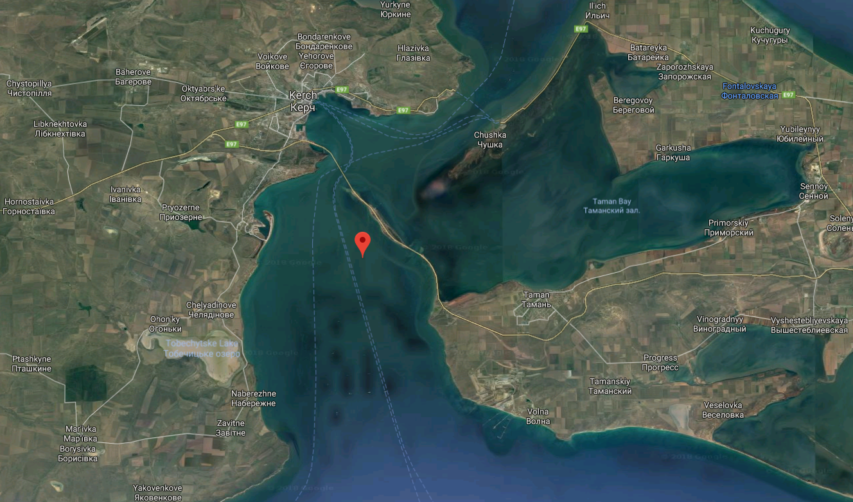The Russians are attempting to cut off Ukrainian access to the Sea of Azov, cloaking that action in standard disinformation to claim that Ukraine is the aggressor, etc. Shoshana Bryen outlines the situation at the moment:
Every story has a starting point. Don’t start with the Russian capture this week of two (or three) Ukrainian ships and the injury to three (or six) Ukrainian sailors. The Russian habit is to do as it likes with smaller countries and then announce that the other guy did it (or it never happened at all). That is the story of the Russian war in Ukraine and the 2014 illegal annexation of Crimea, and that is the Russian story of the Ukrainian ships – two ships, not three, three injured not six; anyhow, Ukraine was sailing out of its lane.
Start instead with the bridge over the narrow Kerch Strait that opened earlier in 2018. It is the only entrance to the Azov Sea from the Black Sea, spanning the Taman Peninsula in Russia and the Kerch Peninsula in Crimea. Earlier plans for the bridge were completed between Russia and Ukraine, but that was before the Russians occupied Crimea. There is an agreement for Ukrainian passage to its two ports along the Azov Sea, but Ukraine has complained that the bridge is the beginning of a blockade that would ultimately control or end Ukrainian shipping. There have been delays for Ukrainian ships passing through, sometimes days, and oh, by the way, the bridge is very low – nearly flat – over the water, meaning that Ukrainian ships over 115 feet can’t pass at all. And now there is a Russian ship parked under the bridge, blocking traffic.
It is estimated that Ukrainian shipping through the strait is down nearly 25% since the bridge opened – as the Ukrainians feared and as the Russians planned.
Austin Bay looks at the military and diplomatic side:
Closing the Kerch Strait effectively blockades Berdyansk and Mariupol, two Ukrainian ports on the Sea of Azov’s north coast.
In 2015, while visiting Crimea, Vladimir Putin himself said he hoped there would be no “full-scale direct clashes” between Ukrainian and Russian forces.
But on Nov. 25, Russia’s war against Ukraine escalated as verifiably Russian coast guard forces under the command of the Russian Federal Security Service intercepted (rammed says Ukraine), boarded and seized two verifiably Ukrainian naval vessels and a Ukrainian tugboat. The 24 Ukrainians on board the ships became Russian prisoners.
The Kremlin claimed the Ukrainian vessels had conducted “dangerous maneuvers” in Russian territorial water.
Putin’s Kremlin specializes in adding complex twists to blatant falsehoods. There is no evidence the Ukrainian ships did anything but try to avoid being intercepted. Russian territorial water? To buy that you must accept Russia’s illegal seizure of the peninsula. However, the strait is an internationally recognized waterway open to transit by commercial shipping and naval vessels. Kerch is comparable to other straits around the globe, like the Strait of Hormuz at the mouth of the Persian Gulf. Iran routinely threatens to close Hormuz to shipping, but to do so would violate freedom of navigation and constitute an act of war.
Defense One reported that Kiev had informed Moscow that its naval vessels would transit the strait. Moreover, the Russians who boarded the Ukrainian ships were special operations commandos.
The Ukrainian ships were making a legal transit. As recently as 2003, Russia guaranteed Ukraine’s right to transit the strait. The 2003 treaty made the strait and Sea of Azov shared territory.
Like invading Crimea, the Russian seizure of Ukrainian ships is a calculated act of war. Russia has now anchored an oil tanker in the main sealane beneath the bridge, blocking all ship traffic.
Ukrainian Foreign Minister Pavlo Klimkin said ramming a Ukrainian vessel was an “act of armed aggression” and that Russia had violated “the freedom of maritime traffic.” He also cited specific articles in the United Nations Convention on the Law of the Sea that “bans the obstruction of peaceful transit across the Kerch Strait.”
Several articles referenced the possibility that NATO would … do something. Other than the usual diplomatic protests, I doubt that there’s much NATO can do in a situation like this. Direct military action should not even be considered an option (not that it’ll stop the odd wild-eyed editorial writer), as NATO does not have a direct interest at risk here. All western nations do have an interest in preserving and upholding freedom of the seas, but Russia knows that the west won’t likely risk getting into a shooting war over incidents like this.
You can get a very useful list of links including the current Kerch Strait confrontation from MILNEWS.ca.




